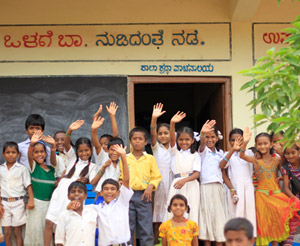
Diana Joseph is the director of Bangalore-based Fourth Wave Foundation, which helps to change lives by being the bridge that connects grass-roots NGOs with the corporate social responsibility wings of companies. It has been working on issues around disability for some years and its Nanagu Shaale programme looks specifically at inclusive education. Here, Ms Joseph tells us about the last two years in the lives children who appeared on the show.
“The children with special needs from the Nanagu Shaale programme have been effectively enrolled into local schools. The children who appeared on the show—go to school now. Their cases emphasize that every child belongs in school and it is our responsibility to ensure a good future for them. The program is now gearing up for Phase II in five new districts.
Nanagu Shaale, or ‘School for me too’ in Kannada, strives to mainstream children with special needs under the Right To Education Act, thereby bringing all students together to learn. The model, in operation in four districts in Karnataka for the last three years, namely Dharwad, Gadag, Haveri and one in semi-urban Bangalore, helps support the state government’s efforts to enable inclusion.
Nanagu Shaale has increased the enrolment of children with disabilities in these four districts by 12.9%. Contrast this to 1% in the previous 5 years. Based on Nanagu Shaale's learning, the early intervention model with children from the age of three years has helped ease their transition from anganwadis to primary schools.
The programme is now geared to expand into five additional districts—Koppal, Raichur, Bijapur, Bagalkote and Kolar—with the mission of 6,000-8,000 enrolments. We work with stakeholders at various levels, including schools, caretakers, parents and the community to conduct capacity-building programmes. Nanagu Shaale workers also undertake physical access audits of schools and assessment of transportation and caregivers, and do sensitization workshops for parents and teachers.
We are now seeking support to create awareness about Home Based Education (HBE), which is being used by schools to deny admission to children with special needs. Sarvya Shiksha Abhiyan asserts that HBE is for children with severe to profound disabilities, but our work in Karnataka shows that nearly 80% of those identified for HBE are mobile and capable of being integrated into normal schools. Yet, they remain in the HBE programme as schools and teachers feel they are not equipped to handle them.
The parents of children with special needs and their communities do not know that these children have the right to be part of mainstream government schools under RTE. It is our dream that ten years from now, we will no longer be discussing the issue of inclusion and there will be a schooling system that is accessible to all.”